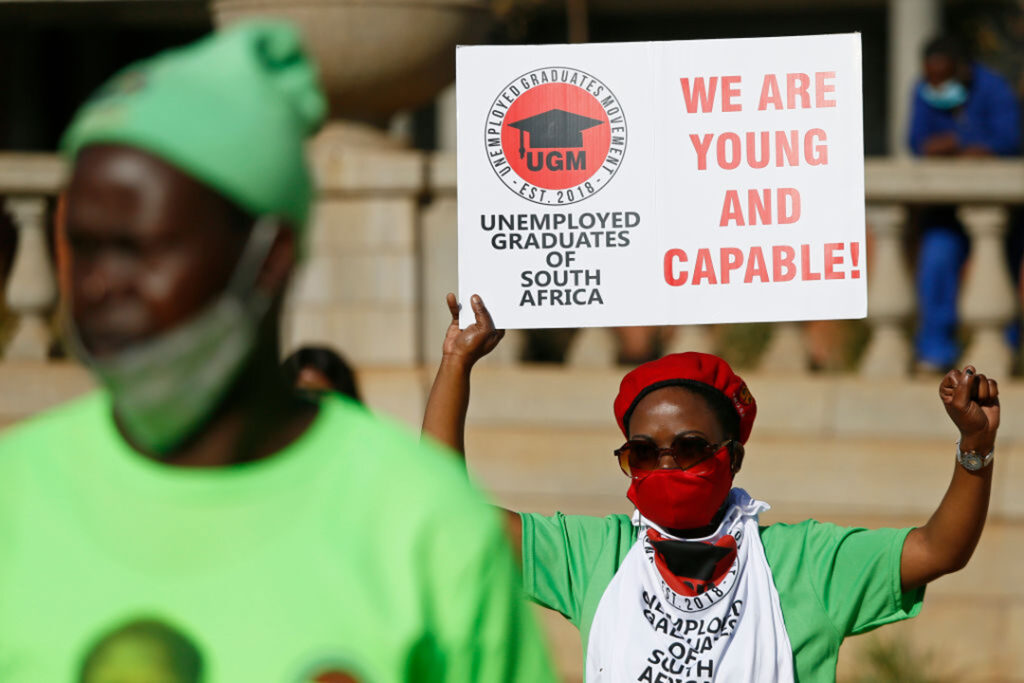ADF STAFF
In the age of COVID-19, many young Africans are struggling to find employment or education options.
According to the United Nations, Africa has the highest youth population in the world, and it is expected to keep rising. But due to the pandemic, economic growth and the new jobs that come with it are not keeping pace.
“We’ve always characterized the youth unemployment numbers as a pandemic of its own,” Nonceba Mhlauli, coordinator of South Africa’s African National Congress Youth League, said during a panel discussion on Newzroom Afrika TV.
“We want to see the kind of drastic response that we saw with the COVID-19 pandemic,” she said. “The gravest concern right now is that we actually have a cohort of young people who are leaving the youth bracket without actually having been employed. They have zero assets, no retirement savings and in the long run will become more dependent on the state for their social security.”
Preliminary findings from a new survey of 4,500 Africans in 15 countries between the ages of 18 and 24 show how profoundly the pandemic has impacted young people.
More than half of respondents in the 2021 Africa Youth Survey said they had lost their jobs or had their education interrupted because of the pandemic.
The polling showed:
- 37% were forced to stop or pause their schooling.
- 19% became unemployed.
- Another 8% had their pay cut.
- 18% had to move back home.
- 10% had to care for family members.
The Johannesburg-based Ichikowitz Family Foundation commissioned the survey, now in its second year. The foundation shared the early findings on September 3.
“While Africa’s young people have historically faced acute unemployment, their future prospects have been dramatically compounded by the COVID-19 virus,” Ivor Ichikowitz said in a news release. “More than half of our next generation report in our survey that they need to pick up the pieces of their lives as a result of the pandemic’s impact.”
Tens of millions of Africans are not in school. In East and Southern Africa alone, UNICEF reports that 70 million are currently out of school. Experts worry that COVID-19 will cause a “Lost Generation” in Africa.
Before the pandemic, nearly 90% of 10-year-olds in Sub-Saharan Africa couldn’t read and comprehend simple text, according to the World Bank.
When young people stop or pause their education, unemployment and poverty typically follow.
“About 600,000 youths graduate from the country’s tertiary institutions yearly, out of which a meager 200,000 manage to get jobs,” read a September 17 editorial in Nigerian newspaper The Guardian. “The remaining roam about the streets, open to recruitment into crime.”
With 60% of its population under 25, Africa is the world’s youngest continent. By 2030, young Africans are projected to make up 42% of the world’s youth — population numbers that highlight the importance of job creation.
But with youth there is energy and enthusiasm.
Kenyan ecologist Kevin Lunzalu, 28, thinks of the pandemic as a “restart button” and believes Africa’s young people represent hope in the form of a future workforce that can lead the continent in building a vibrant post-COVID economy.
In a September 16 blog post, he called for governments to empower their young people by supporting young entrepreneurs, making quality education affordable, creating jobs for graduates and adopting modern technological infrastructure.
“Access to youth innovation hubs could incubate, accelerate, and attract funding to implement unique ideas,” he wrote. “It would also fasten response to existing socio-economic challenges, build the resilience of countries, empower youth economically, and enhance Africa’s preparedness for future disruptions.”

